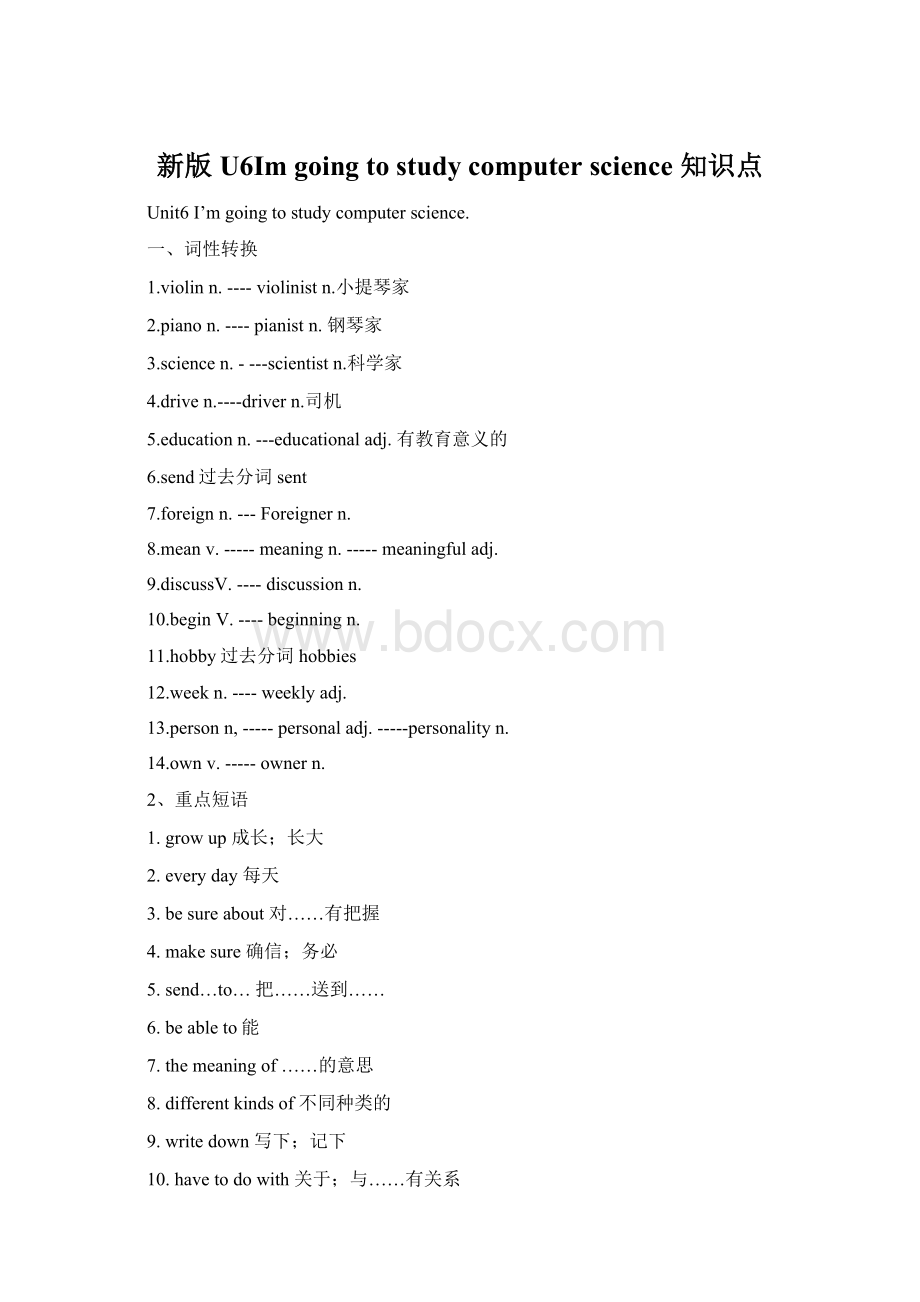新版U6Im going to study computer science 知识点.docx
《新版U6Im going to study computer science 知识点.docx》由会员分享,可在线阅读,更多相关《新版U6Im going to study computer science 知识点.docx(18页珍藏版)》请在冰豆网上搜索。

新版U6Imgoingtostudycomputerscience知识点
Unit6I’mgoingtostudycomputerscience.
一、词性转换
1.violinn.----violinistn.小提琴家
2.pianon.----pianistn.钢琴家
3.sciencen.----scientistn.科学家
4.driven.----drivern.司机
5.educationn.---educationaladj.有教育意义的
6.send过去分词sent
7.foreignn.---Foreignern.
8.meanv.-----meaningn.-----meaningfuladj.
9.discussV.----discussionn.
10.beginV.----beginningn.
11.hobby过去分词hobbies
12.weekn.----weeklyadj.
13.personn,-----personaladj.-----personalityn.
14.ownv.-----ownern.
2、重点短语
1.growup成长;长大
2.everyday每天
3.besureabout对……有把握
4.makesure确信;务必
5.send…to…把……送到……
6.beableto能
7.themeaningof……的意思
8.differentkindsof不同种类的
9.writedown写下;记下
10.havetodowith关于;与……有关系
11.takeup开始做;学着做
12.hardlyever几乎不;很少
13.too…to…太……而不能……/太……以至于不能
14.begoingto+动词原形打算做某事
15.practicedoing练习做某事
16.keepondoingsth.不断地做某事
17.learntodosth.学会做某事
18.finishdoingsth.做完某事
19.promisetodosth.许诺去做某事
20.helpsb.todosth.帮助某人做某事
21.remembertodosth.记住做某事
22.agreetodosth.同意做某事
23.lovetodosth.喜爱做某事
24.wanttodosth.想要做某事
3、重点句子
1.—Whatdoyouwanttobewhenyougrowup?
—Iwanttobeabasketballplayer.
2.—Howareyougoingtodothat?
—那你打算怎么做呢?
—I’mgoingtopracticebasketballeveryday。
3.—Wow,nowIknowwhyyou’resogoodatwritingstories。
—哇,现在我知道你为什么如此擅长写故事了。
4.—Mostofthetime,wemakepromisestootherpeople。
However,promisesyoumaketoyourselfareresolutions。
大多数时间,我们向其他人保证。
然而,你向自己做的保证是决心。
5.Somepeoplewritedowntheirresolutionsandplansforthecomingyear.
一些人写下他们来年决心和计划.
6.Thishelpsthemtoremembertheirresolutions
这帮助他们记住自己的决心.
7.Manyresolutionshavetodowithself-improvement.
许多决心和自我提高有关系.
8.Forthisreason,somepeoplesaythebestresolutionistohavenoresolutions.
因为这个原因,一些人说最好的决心就是不下决心.
9.Thethirdresolutionisaboutimprovingmyrelationshipswithmyfamilyandfriends.
第三个决心是关于改善我和我家人、朋友关系的.
10.Thelastresolutionisabouthowtodobetteratschool.
最后一个决心是关于怎样在学校里做的更好的.
4、语言点
1、一般将来时
a)一般将来时的构成:
由助动词shall或will加动词原形构成,shall用于第一人称。
在口语中,will在名词或代词后常简略为’ll,willnot常简略为won’t。
这个时态的肯定,否定和疑问结构可表示如下:
肯定句
否定句
疑问句
I(We)shall(will)go.
You(He,She,They)willgo.
I(We)shall(will)notgo.
You(He,She,They)willnotgo.
ShallI(we)go?
Willyou(he,she,they)go?
用”begoingto+动词原形”也可表示将来时,表示将要发生的事,打算或决定要做的事。
Ithinkitisgoingtosnow.我看要下雪。
b)一般将来时的用法:
1)表示将要发生的动作或情况;
2)不以人的意志为转移,肯定要发生的事情。
ThedayaftertomorrowwillbeNationalDay.后天是国庆日。
c)一般将来时的时间状语标志词:
1.含tomorrow;next短语;
2.in+段时间;
3.howsoon;
4.by+将来时间;
5.bythetimesb.do…
6.祈使句句型中:
or/andsb.willdo
7.在时间/条件状语从句中,如果从句用一般现在时,主句用将来时
8.anotherday
2、in 与after的区别
in是指以现在时间为起点的“在一段时间以后”。
也可以表示“在将来多少时间之内”,句子中的谓语动词要用一般将来时态;after常指以过去时间为起点的“一段时间之后”,所以它与过去时态连用。
当after指某个特定的未来时刻或日期之后,或指以将来某一时间为起点的若干时间之后时,它可以与将来时态连用。
例句:
I'llbebackinhalfanhour.我半小时后就回来.
本句中的in作"以后"解,不能用after代替。
after和in都可以表示"以后"的意思,其区别是:
1)after以过去为起点,表示过去一段时间以后,常用于过去时态的句子。
例如:
Theystartedworkingafterlunch.他们是午餐后开始工作的。
Thefilmwasshownafterthemeeting.电影是会议结束以后放的。
2)in以现在为起点,表示将来一段时间以后,常用于将来时态的句子。
如:
Theywillstartworkinginhalfanhour.他们将在半小时后开始工作。
Thefilmwillbeshownin2or3days.这部电影将在两三天后上映。
3)在某个特定的时间以后,after也可用于将来时态的句子。
例如:
Theywillstartworkingafter10am.他们将在上午10点以后开始工作。
Thefilmwillbeshownafter5o'clock.这部电影将于4点以后上映。
4)“after+一段时间”或“一段时间+later”表示“(在过去某个时间看来)一段时间之后”。
Hewenthomeaftertwodays.
他两天后回家了。
Threeyearslater,shehadababy.
三年后,她生了一个婴儿。
征对性练习
一.根据句意,用括号中动词的适当形式填空。
1.We________(go)fishingtomorrow.
2.Whatareyougoing________(do)thisevening?
3.—Wouldyouliketoplayfootballwithus?
—I'dloveto.ButI________(help)mymotherafterlunch.
4.—Isyourbrotherin?
—Yes.Buthe____(leave)forEgyptsoon.
5.—Whattime________we________(start)?
—Ateighttomorrowmorning.
二.请在下列各题空格处填入shall或will。
1.You______notdrivethrougharedlight.
2.I______doeverythingforher.
3.______youhelpmewiththisheavybag,John?
4.______Ihelpyouwiththatheavybag,Madam?
5.Let'sgoandtakeawalkafterdinner,____we?
6."Noone______leavetheclassroomifIhaven'tsaidOkay,"saidtheteacher.
7.It______soonbeover,Iamsure.
8.Dowhatyou______,butdon'tgoout.
9.I______takeyoutherewithme,ifit'sOKwithyourmother.
10.Rainorshine,I______come.
3.fall的短语:
n.秋天,秋季
v.掉落,掉下
(1)fallbehind:
落在······的后面
e.g.Workharder,oryouwillfallbehindothers.
(2)falloff:
从······上掉下来
e.g.Maryfellofftheladderlastnight.
(3)fallinlovewith
(4)fallover
4、Therebe结构
英语中,Therebe句型常表示某处有某人或某物。
例如:
Therearealwaysmorethanonehundredbirdsinthebigtreeeveryevening.每天傍晚那棵大树上总会有100多只小鸟。
一、Therebe句型的用法:
1)There与be中间可插入一些表示推测的情态动词、表示时态的短语和一些动词短语,以强调某种语气。
例如:
Theremustbesomeflowersinthebox.盒子里肯定有些鲜花。
Therehappenedtobesomemoneyinmypocket.我的口袋里碰巧有一些钱。
Therewillbeameetingthisafternoon.注意:
be不能换成have及have的变化形式。
2)Therebe句型常与过去时间状语连用,构成一些固定句型,用于故事发生的开头,交代故事发生的时间。
例如:
Manyyearsago,therewassuchabeautifulgirlcalledCindy.很久以前有一个叫Cindy的美丽女孩。
3)Therebe句型可换成Therecome/go,以引起注意,加强语气。
例如:
Therecomesthebus.公共汽车来了。
4)Therebe句型或There加其他动词的句型,其动词的单复数,常采用就近一致的原则。
例如:
Thereisadesk,twochairsandthreebenchesintheroom.Therearetwochairs,adeskandthreebenchesintheroom.
5)Therebe或There加其他动词的句型,其反意疑问句一律用…there?
例如:
Thereisacatinthegarden,isn'tthere?
Thereusedtobenohousehere,usedthere/didthere?
(过去这儿没有房子,是吗?
)
二、使用Therebe句型时应注意:
1、therebe结构中的be是可以运用各种时的。
Thereisgoingtobeameetingtonight. 今晚有个会议。
Therewasaknockatthedoor. 有人敲门。
Therehasbeenagirlwaitingforyou. 有个女孩一直在等你。
Therewillberainsoon.不久天就要下雨了。
2. 动词be单复数形式要跟therebe之后的真正的主语一致。
并且要根据就近一致原则来变换be的单复数形式。
如:
Thereisabookonthedesk.课桌上有一本书。
Howmanypeoplearethereinthecity?
这个城市里有多少人口。
Thereisapenandtwobooksonthedesk. 课桌上有一个钢笔和两本书。
3.在there be引起的句子结构中,用来修饰主语的不定式主动形式和被动 形式均可。
Thereisnotimetolose (=tobelost).时间紧迫。
Thereisnothingtosee (=tobeseen).看不见有什么。
Thereisnothingtodo.(=tobedone) 无事可做。
4、Thereisnodoing.(口语)不可能…….
Thereisnotellingwhenhewillbeback.
无法知道他什么时候回来。
Thereisnoknowingwhatheisdoing.
无法知道他在做什么。
4、.therebe与have的区别:
1)含义不同。
therebe表示的是“某地(时)有某人(物)”,强调“存在关系”。
Have则表示“某人(物)所有”,强调“所属关系”。
如,
Thereisabusinyourfactory.(公共汽车不一定属于我们厂所有)
Ourfactoryhasabus.(公共汽车属于我们厂所有)
2)句型不同。
therebe句型为“Therebe+某人(物)+某时(地)”;have句型为“某人(物)+have(has)+某物(人)。
如Thereisn’tacatunderthechair.Shedoesn’thavetwobrothers.
3)当表示某物的构成和组成部分时,用therebe和have均可。
如,Ourschoolhassixtyclasses.=Therearesixtyclassesinourschool.我们学校有60个班。
【注意】therebe句型中有两个或多个并列主语时,须根据就近原则,be与最靠近的主语在数上保持一致。
如,Therearetwoeggsandacupofmilkonthetable.
Therebe句型的将来时表达方式:
肯定:
Therewillbe…否定:
Therewon’tbe…一般疑问句:
Willtherebe….?
Yes,therewill.No,therewon’t.
相关练习:
1.There___anyriceinthebowl.
A.are B.is C.isn’t D.aren’t
2.There___not___milkinthecup.
A.are,many B.are,much
C.is,many D.is,much
3.There___manyapplesonthetreelastyear.A.havebeen B.were C.are D.is
4.Doyouknowif___ameetingnextSunday?
A.therewasgoingtohave
B.therewasgoingtobe
C.istheregoingtobe
D.therewillbe
5.-Isthisthelastexamwehavetotake?
-No,butthere____anothertestthreemonthslater.
A.willbegoingto B.is
C.willbe D.hasbeen
6.There______greatchangesinsuchkindofcomputersinthelastfewyears.
A.is B.are C.willbe D.havebeen
7.There _____ afilmtomorrowevening.A.willhave B.have
C.isgoingtobe D.has
8.There____aschoolatthefootofthehill. A.have B.stand
C.are D.stands
9.There'sgoingto____intomorrow'snewspapers.
A.havesomethingnew
B.havenewsomething
C.besomethingnew
D.benewsomething
10.Thereissomemilkinthebottle,____?
A.isn'tthere B.aren'tthere
C.isn'tit D.arethere
11.Howmanyboys____thereinClassone?
A.be B.is C.are D.am
12.There____alotofgoodnewsintoday'snewspaper.
A.is B.are C.was D.were
13_anyflowersonbothsidesofthestreet?
A.Isthere B.Arethere C.Has D.Have
14.There____greatchangesinourcountrysince1982.
A.havebeen B.were C.hasbeen D.are
15.Thereislittlewaterintheglass,____?
A.isn'tthere B.isn'tit
C.isit D.isthere
16.----Thereisnoairorwateronthemoon.Isthere?
---____.
A.Yes,thereare B.No,thereisn't
C.Yes,thereisn't D.No,thereis
17.----Whatdidyouseeinthebasketthen?
----There____abottleoforangeandsomeoranges.
A.is B.are C.was D.were
18.____anyflowersonbothsidesofthestreet?
A.Isthere B.Arethere
C.Has D.Have
19.____isthereonthetable?
A.Howmanyapples B.HowmuchbreadC.Howmuchbreads D.Howmanyfood
20.Thereisn't____paperinthebox.Willyougoandgetsomeforme?
A.any B.some C.a D.an
4、everyday与everyday区别:
everyday名词短语,表示“每天”,通常与一般现在时连用;而everyday形容词,表示“日常的,每天发生的,每日所用的”。
例如:
Igetupatsixeveryday.我每天6点起床。
Hewearseverydayclothestoday.今天他穿一身便服。
Wear、puton、have..in的区别
wear表示“穿”,表示状态,用一般现在时表示经常状态,用现在进行时表示暂时状态。
eg.Wewearourrainbootsonarainyday.
我们在下雨天穿雨鞋。
Sheiswearinganewcoat.
她穿着一件新衣服。
Doeshewearglasses?
她戴眼镜吗?
puton是“穿上”,“戴上”的意思,强调动作。
eg.Sheputonaredcoatandwentout.
她穿上红色大衣出去了。
注意:
puton是一时的动作,不能跟表示一段时间